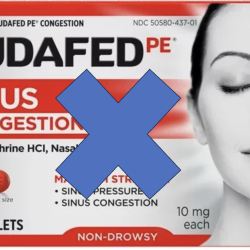Cato Institute's Dr. Jeffrey Singer, in an opinion piece in USA Today, writes that for years we've been buying and using an ineffective, potentially dangerous decongestant. Why? Just another futile attempt to restrict access to illegal drugs, in this case, methamphetamine. With phenylephrine off pharmacy shelves, the ACSH advisor explores what this means.

Just before cold and flu season is set to kick off, the Food and Drug Administration's advisory panel last month reported that an oral decongestant Americans have relied on for nearly 20 years is no better than a placebo.
This ingredient found in popular versions of Sudafed, Dayquil and other medications has gained popularity since Congress made it difficult for people to obtain an effective oral decongestant. Now, lawmakers can correct that mistake before the winter cold and flu season arrives in full force.
In an effort to shut down homegrown meth labs in which people converted oral decongestants containing pseudoephedrine into methamphetamine, Congress 18 years ago passed the Combat Methamphetamine Epidemic Act. Under the CMEA, the Drug Enforcement Administration ordered all pseudoephedrine-containing products moved “behind the counter” and required pharmacists to register and track people who purchased them.
#Reprinted with permission of USA Today. Dr. Singer's entire article can be read here.
